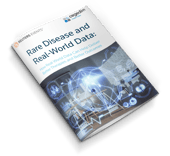How can RWD and RWE supplement clinical trial data in rare diseases?

The healthcare industry stores over 2,300 exabytes of healthcare data, according to the World Economic Forum, with the vast majority going unused, siloed in different formats, structures, and locations.
Developing and delivering novel rare disease therapies via traditional routes is challenging
Meanwhile, 30 million people in Europe live with rare diseases, many with unmet medical needs. Trying to meet these needs and improve treatment options for rare diseases isn’t always viable, because large knowledge gaps in our understanding of a rare disease and small population sizes can make the R&D process particularly challenging and costly.
Randomized clinical trials (RCTs), which collect hard endpoint data in rigid, tabulated case report forms, have been the gold standard for proving the efficacy of an investigational product (IP) or therapy for many years, and traditionally the sole route to marketing approval.
Unfortunately, small populations in rare diseases limit the statistical power of clinical trials, meaning that the data collected is often not enough to uphold the burden of proof needed to obtain marketing authorisation for novel therapies. Not only this but knowledge gaps make designing a suitable trial challenging, with not much prior literature to build upon.
Once an RCT in a rare disease space is up and running, recruiting participants and conducting the trial can also be substantially more difficult than in non rare diseases.
Factoring in recruitment issues in a rare disease population means R&D costs go up drastically just as the population with the unmet need comes down. Simply put, recuperating development costs for many rare disease therapies is not currently possible under the RCT only model of regulatory approval.
It’s not difficult to see why improving the standard of care and treatment options available to rare disease patients- if there are any treatments available- can be particularly slow, leaving patients and their families in many cases without much hope of rapid changes in their treatment space.
Exacerbating the problem, small populations may introduce patient data protection challenges such as maintaining anonymisation, meaning some patients from smaller EU countries may be entirely off-limits.
Clearly, if other types of patient healthcare data could be used to paint a clearer picture of a novel compound’s benefits and risks reliably and transparently, ignoring this potential would not be helping patients. A host of healthcare information exists which could be used for this purpose, in the form of clinical and centralized databases and registries, transaction data and consortia, and is known as Real-World Data (RWD). RWD sources can be used to create context and provide evidence of medicinal benefits in the real-world, outside of the rigid RCT framework, and these insights are collectively known as real-world evidence (RWE).

Rare Diseases Whitepaper
Rare Disease and Real-World Data: How Real-World Data Can Help Deliver Better Therapies and Better Outcomes
RWE can be combined with trial data to support regulatory decision-making
In recent years some regulators, such as the EMA and FDA, have been reconsidering their position on RWE. Currently RWE is used to expand on disease epidemiology, progression, and patient pathways. Its use is also well established as part of post-approval safety monitoring of new medicines, but typically it is not used to help demonstrate drug effectiveness in the regulatory approval process.
However, both the EMA and FDA have issued multiple new guidance frameworks on how to optimize the use of high quality, reliable and transparent RWE to support regulatory decision making in combination with trial data.
Furthermore, to explore the potential of RWE in Europe, the European Medicines Regulatory Network (EMRN) has undertaken an ambitious new initiative to promote the use of RWE: the Data Analysis and Real-World Interrogation Network (DARWIN EU). DARWIN´s aim is to establish the value of RWE across a spectrum of regulatory use cases by 2025, to help demonstrate the value of RWE, whilst pragmatically honing the techniques for using it well.



